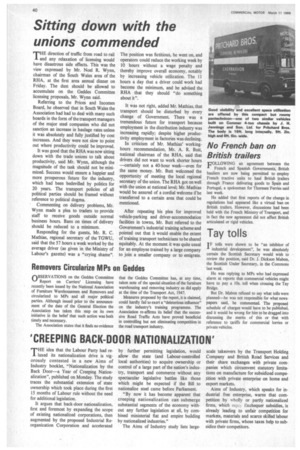'CREEPING BACK-DOOR NATIONALIZATION'
Page 42

If you've noticed an error in this article please click here to report it so we can fix it.
THE idea that the Labour Party had re!axed its nationalization drive is vigorously contested in a new Aims of Industry booklet, "Nationalization by the Back Door—a Year of Creeping Nationalization", published on Monday. The study traces the substantial extension of state ownership which took place during the first 15 months of Labour rule without the need for additional legislation.
It argues that back-door nationalization, first and foremost by expanding the scope of existing nationalized corporations, then augmented by the proposed Industrial Reorganization Corporation and accelerated by further permitting legislation, would allow the state (and Labour-controlled local authorities) to acquire ownership or control of a large part of the nation's industry, transport and commerce without any spectacular legislative battles like those which might be expected if the Bill to nationalize steel came before Parliament.
"By now it has become apparent that creeping nationalization can submerge substantial segments of the economy without any further legislation at all, by combined ministerial fiat and empire building by nationalized industries."
The Aims of Industry study lists large
scale takeovers by the Transport Holding Company and British Road Services and their share exchanges with private companies which circumvent statutory limitations on manufacture for subsidized competition with private enterprise on home and export markets.
Aims of Industry, which speaks for industrial free enterprise, warns that competition by wholly or partly nationalized firms, which Exchequer subsidies, is already leading to unfair competition for markets, materials and scarce skilled labour with private firms, whose taxes help to subsidize their competitors.








































































































































